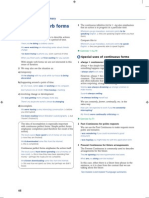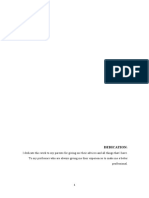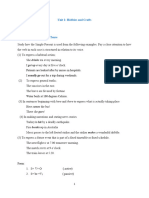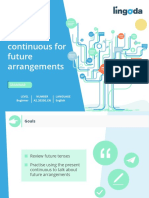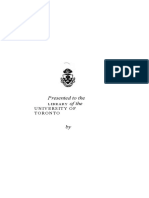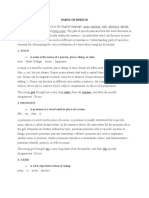English Mother Fucker
English Mother Fucker
Uploaded by
guifracaro1234Copyright:
Available Formats
English Mother Fucker
English Mother Fucker
Uploaded by
guifracaro1234Copyright
Available Formats
Share this document
Did you find this document useful?
Is this content inappropriate?
Copyright:
Available Formats
English Mother Fucker
English Mother Fucker
Uploaded by
guifracaro1234Copyright:
Available Formats
Continuous verb forms A - General 1 - We use continuous verb forms to describe actions which we see happening over a period
of time: I hear you're doing a cookery course We were watching an interesting series about murders. I've been trying to phone you. (over a period of time) When you finish work, we'll be waiting for you outside. With simple verb forms we are not interested in this sense of duration. 2 - We may also see the situation as: a) temporary We're staying with my uncle while our house is being decorated. b) happening around a point of time At 12 o'clock, James was still working on his computer. Don't phone me at 12.00. I'll be having a meeting. c) involving change or development She was getting more disobedient every day. There's no doubt the world's climate is changing. d) incomplete We were having a very interesting conversation. (=before you interrupted) I've been reading Nelson Mandela's autobiography. (=but I haven't finished it) **The idea of incompletion is especially important with continuous perfect forms. Simple perfect forms emphasise completion (and therefore the result of the action). The local council have spent a lot of money on new roads. (=now they are finished) We'd downloaded some files from the internet (= this is completed) Continuous perfect forms emphasise the action itself. The local council have been spending a lot of money on new roads. (= this is how they have been spending their money - perhaps the roads are not complete) We'd been downloading some files from the internet. (= this way how we spent our time, but perhaps we didn't finish) 3 - The continuous infinitive (to) be + ing also emphasises that an action is in progress at a particular time. Wherever you go nowadays, everyone seems to be speaking English. (= they are speaking English when you hear them) Compare to this: Wherever you go nowadays, everyone seems to speak English. (= they are generally able to speak English) B - Special uses of continuous forms 1 - always + continuous forms always + the simple form simply indicates that something happens regularly. I always start work early. However, always + the continuous form is also common. This stresses the repetitiveness of the action and often indicates that the speaker finds the repeated action surprising, strange or irritating. Stanley was always dreaming up strange schemes to make money. Christian's always smiling.
I'm always locking myself out. We use constantly, forever, continually, etc. in the same way. How can I be expected to work if you're constantly interrupting? My parents were continually criticising me. 2 - Past Continuous for polite requests We can use the Past Continuous to make requests more polite and tentative. I was wondering if you could recommend a good restaurant. I was hoping you might help me with this application form. 3 - Present Continuous for future arrangements The Present Continuous is commonly used to describe arrangements for the future. They're opening that new hypermarket next week. What are you doing over Christmas? In this case, either there is a future time phrase in the sentence, or it is clear from the context that we are talking about the future. 4 - Modal verbs With modal verbs, the continuous infinitive can have a different meaning from the simple infinitive. They might be staying at the Sheraton Hotel. (= present possibility) They might stay at the Sheraton Hotel. (= future possibility) What a terrible noise! They must be having a party. (= logical necessity) We must have a party soon. (= personal obligation) C - Verbs which change meaning in continuous and simple forms 1 - State verbs Verbs which describe states only occur in the simple form. Nick seems very friendly. I didn't know Clayre's dad. He died before we met. The most commom state verbs are: be verbs of possession and unchangeable states (have, weigh, measure, fit) Oh dear, this dress doesn't fit any more. verbs to do with the senses (appear, see, look, smell, taste) The minister appers puzzled by the accuusations against him. verbs describing thoughts and processes (think, feel, expect) I expect he'll soon be here. 2 - Verbs to describe states and actions If the verbs above are used in the continuous form, they become 'actions' of some sort. a) The verb to be occurs in the continuous form when it refers to behaviour which is temporary and/or deliberate (i.e. a kind of 'action') Why is everybody so unhelpful? (= they are always like this - a state) Why is everybody being so unhelpful? (= they aren't normally like this) Note that is being cannot be used when there is no volition (deliberate will) involved. The weather is being very wet at the moment.
b) Other verbs have a different meaning in their continuous and simple forms. States Actions It looks/appears to be OK. (= seems) I see a bright light. (= with my eyes) I think that's all. (= suppose/guess) I expect you're tired. (= imagine) I have always admired him. (have a good opinion of) I have a large family. (posses) It weights 82kg and measures 3 metres. (fact) My suit doesn't fit me any more. (it's not the correct size) And the referee is looking at his watch. (performing) I'm seeing Thomas tonight. (meeting) I'm thinking about what you said. (considering) I'm expecting and important phone call. (waiting for) I was just admiring your new car. (look at appreciation) She's having a bath. (taking) The nurse is weighing and measuring the baby. (an activity) A man is fitting a new shower unit. (installing)
**A few verbs which describe physical feelings (feel/hurt/ache) can be used in either the simple or continuous form to talk about the present moment. There is no difference in meaning. Why are you lying down? My back hurts/is hurting. Are you feeling/do you feel better today?
You might also like
- (Realities: Best Practices For English Language LearnersDocument228 pages(Realities: Best Practices For English Language LearnersJuliana DiazNo ratings yet
- English Grammar ExplanationsDocument13 pagesEnglish Grammar ExplanationsНикола Каранфиловски100% (3)
- Karnevskaya Elena On The Way To Success. Na Puti K Uspehu Readli - Net Bid255356 Original 4692dDocument94 pagesKarnevskaya Elena On The Way To Success. Na Puti K Uspehu Readli - Net Bid255356 Original 4692dIrinaNo ratings yet
- Е. Карневская, З. Курочкина, Е. Мисуно - On the Way to SuccessDocument96 pagesЕ. Карневская, З. Курочкина, Е. Мисуно - On the Way to SuccesssophyNo ratings yet
- Lesson Plan Vii Conditional Clauses FinalDocument5 pagesLesson Plan Vii Conditional Clauses FinalDiana GhebanNo ratings yet
- Z03 Nce SB 12qat 7272 LS1Document4 pagesZ03 Nce SB 12qat 7272 LS1anouar_maalej3624No ratings yet
- Continuous Verb FormsDocument4 pagesContinuous Verb FormswendiwendiNo ratings yet
- Continuous Verb FormsDocument3 pagesContinuous Verb FormswendiwendiNo ratings yet
- XauqueDocument25 pagesXauqueLindsey StokesNo ratings yet
- On The Way To SuccessDocument94 pagesOn The Way To SuccessSam EvoNo ratings yet
- One of These Parts Contains An ErrorDocument26 pagesOne of These Parts Contains An ErrorJohn Michael CueNo ratings yet
- Língua Inglesa III RevisãoDocument6 pagesLíngua Inglesa III RevisãoMiltonDmNo ratings yet
- Tense ReviewDocument11 pagesTense ReviewImeneBelNo ratings yet
- Will and Be Going To: PerfectDocument3 pagesWill and Be Going To: PerfectJessica LemosNo ratings yet
- Repaso de Gramática InglésDocument18 pagesRepaso de Gramática InglésDaniel Márquez GómezNo ratings yet
- Verb Practice2Document15 pagesVerb Practice2t7n48cd5zqNo ratings yet
- Present and Future TensesDocument15 pagesPresent and Future TensesysarkovichNo ratings yet
- Formation of Simple Present TenseDocument20 pagesFormation of Simple Present TenseLeo ZerpaNo ratings yet
- Tense: Es Add For The Third Person Singular (Works, Goes)Document16 pagesTense: Es Add For The Third Person Singular (Works, Goes)api-19776105No ratings yet
- GrammarDocument25 pagesGrammarPedro MarsiNo ratings yet
- English Tenses IIDocument17 pagesEnglish Tenses IIEdwin CfracoNo ratings yet
- Gramática Del InglésDocument12 pagesGramática Del InglésLuis Enrique Ramirez PadillaNo ratings yet
- Iv. Grammar Reference 1. Present SimpleDocument8 pagesIv. Grammar Reference 1. Present Simpleandra.jora.92No ratings yet
- LA1 Present Simple & Present Continuous INPUTDocument6 pagesLA1 Present Simple & Present Continuous INPUTtalhacyln52No ratings yet
- The Simple Present TenseDocument21 pagesThe Simple Present TenseHamza djioui - حمزة ادجيويNo ratings yet
- Lesson N°3 Future Simple and ContinuousDocument8 pagesLesson N°3 Future Simple and ContinuousKamil HenriquezNo ratings yet
- Aydade VenecoDocument21 pagesAydade VenecoFrank BluessNo ratings yet
- English Grammar Lii 2020Document25 pagesEnglish Grammar Lii 2020adjeponehNo ratings yet
- Simple Present Tense: From Group 2Document7 pagesSimple Present Tense: From Group 2Yuliah AsrumNo ratings yet
- Present Tense - Reading MaterialDocument14 pagesPresent Tense - Reading MaterialMs Chikoti Sai Vaishnavi IPENo ratings yet
- 5 Present Continuous or Simple?: B Thoughts, Feelings and StatesDocument4 pages5 Present Continuous or Simple?: B Thoughts, Feelings and Statesleonor cfjNo ratings yet
- Antonius Chiky Betricia Yuniaringtyas Clara Cleodora YuvitaDocument25 pagesAntonius Chiky Betricia Yuniaringtyas Clara Cleodora YuvitaClara Cleodora100% (1)
- TensesDocument22 pagesTensesZinebNo ratings yet
- Present ContinuousDocument44 pagesPresent ContinuoushootanNo ratings yet
- Present Sim Vs Present ConDocument6 pagesPresent Sim Vs Present ConNatthaponNo ratings yet
- English ClassDocument14 pagesEnglish ClassNatthaponNo ratings yet
- Summary of EnglishDocument10 pagesSummary of Englishfernanda23enfNo ratings yet
- Unit 2 (Complete)Document12 pagesUnit 2 (Complete)Diego CabezasNo ratings yet
- English Tenses Past Simple and Continuous: Grammar RulesDocument3 pagesEnglish Tenses Past Simple and Continuous: Grammar RulesPeter DarmalaNo ratings yet
- Grammar Tense Part 1 - StudentDocument14 pagesGrammar Tense Part 1 - StudentWang XyyNo ratings yet
- Simple Future TenseDocument11 pagesSimple Future TenseArifa NurhudayantiNo ratings yet
- Assignment 06: Course: Basic English (ENG-101)Document6 pagesAssignment 06: Course: Basic English (ENG-101)Shamsul Islam RaisyNo ratings yet
- English Tenses & Verb FormsDocument24 pagesEnglish Tenses & Verb FormsMannie Ayo-soremiNo ratings yet
- Active VoiceDocument125 pagesActive VoiceAyesha AfzalNo ratings yet
- Unit 1. Present TensesDocument6 pagesUnit 1. Present TensespamelaNo ratings yet
- Lec 3Document4 pagesLec 32023311279No ratings yet
- Present Simple: Subject + Verb/verb + (E) SDocument7 pagesPresent Simple: Subject + Verb/verb + (E) STariq AhmedNo ratings yet
- Pet Grammar PointsDocument69 pagesPet Grammar PointsTatiana ZaraNo ratings yet
- Inglés Instrumental: Unit 1. Verb Tenses. Present Simple and ContinuousDocument6 pagesInglés Instrumental: Unit 1. Verb Tenses. Present Simple and ContinuousclaudiaNo ratings yet
- Academia de Ingles: Instituto Tecnologico Superior de MonclovaDocument45 pagesAcademia de Ingles: Instituto Tecnologico Superior de MonclovacrioanaNo ratings yet
- Verb Tenses: The Simple PresentDocument10 pagesVerb Tenses: The Simple PresentbeghinboseNo ratings yet
- Remedial Chapter IDocument26 pagesRemedial Chapter Iamare meketeNo ratings yet
- InglésDocument33 pagesInglésa01711407No ratings yet
- English 2mothDocument78 pagesEnglish 2mothMichaelNo ratings yet
- Englis 123Document39 pagesEnglis 123Cindy EysiaNo ratings yet
- Progressive TensesDocument7 pagesProgressive TensesAinin SofiaNo ratings yet
- Questions About Future TrabajoDocument9 pagesQuestions About Future Trabajojesus caraballoNo ratings yet
- English Grammar SecretsDocument44 pagesEnglish Grammar SecretsSebastian CondeNo ratings yet
- Simple Present TenseDocument6 pagesSimple Present TenseMeto FirmansyahNo ratings yet
- English Verb Tenses: Practice and Speak Like a NativeFrom EverandEnglish Verb Tenses: Practice and Speak Like a NativeRating: 5 out of 5 stars5/5 (1)
- Adverbs HomeworkDocument4 pagesAdverbs HomeworkErika MurilloNo ratings yet
- English-9 SLM Q1 W3 M3 V1.0-CC-releasedDocument18 pagesEnglish-9 SLM Q1 W3 M3 V1.0-CC-releasedmalouNo ratings yet
- Engleza Cls A 9 A B Bar2023Document3 pagesEngleza Cls A 9 A B Bar2023Ana MariaNo ratings yet
- तलाठी पेपर 2023 22 ऑगस्ट 2023 शिफ्ट 2Document40 pagesतलाठी पेपर 2023 22 ऑगस्ट 2023 शिफ्ट 2swapnilahire8421No ratings yet
- LEVEL IV. TEST. April 2020Document2 pagesLEVEL IV. TEST. April 2020Ana RodriguezNo ratings yet
- Pre-intermediate-U7-A Short Biography of A Famous PersonDocument1 pagePre-intermediate-U7-A Short Biography of A Famous Personsarah-saudhotmail.comNo ratings yet
- VSTEP-Reading ONLINE PracticeDocument9 pagesVSTEP-Reading ONLINE Practice03- Trịnh Thị Ngọc BíchNo ratings yet
- Present Continuous For Future Arrangements: GrammarDocument27 pagesPresent Continuous For Future Arrangements: GrammarMehrdad100% (1)
- The GENOMA-KB Project: Towards The Integration of Concepts, Terms, Textual Corpora and EntitiesDocument4 pagesThe GENOMA-KB Project: Towards The Integration of Concepts, Terms, Textual Corpora and EntitiesRidwan IlyasNo ratings yet
- Hussain GrammarDocument45 pagesHussain GrammarSandeep Varma'sNo ratings yet
- Silabus Get Along With English 2Document7 pagesSilabus Get Along With English 2Sigit HidayatNo ratings yet
- SimoonPhilp Oliver MackeyReview - PreprintDocument8 pagesSimoonPhilp Oliver MackeyReview - PreprintabdulqadirtamiangNo ratings yet
- Mcsethesis Tanmoy ChakrabortyDocument229 pagesMcsethesis Tanmoy ChakrabortyConstantino Soares ExpostoNo ratings yet
- Passive ExerciseDocument3 pagesPassive Exercisenato.kharshiladze.1No ratings yet
- Full Chapter Discourse Analysis A Practical Introduction 1St Edition Canning PDFDocument48 pagesFull Chapter Discourse Analysis A Practical Introduction 1St Edition Canning PDFjoseph.castillo585100% (8)
- Modal Auxiliaries: Could May Might Shall ShouldDocument2 pagesModal Auxiliaries: Could May Might Shall ShouldMariangel GavidiaNo ratings yet
- Swahilienglishdi00madauoft - BW - KopiaDocument770 pagesSwahilienglishdi00madauoft - BW - KopiaMartyneJohnNo ratings yet
- Present ContinuousDocument2 pagesPresent ContinuousEstherEscudero0% (1)
- 4th Grade Learning TargetsDocument94 pages4th Grade Learning TargetsJessica PharrNo ratings yet
- Curriculum Map Grade 9 EnglishDocument21 pagesCurriculum Map Grade 9 EnglishYellowed McLekaniNo ratings yet
- Ugel Puno Ranking 2014Document114 pagesUgel Puno Ranking 2014Isidro FloresNo ratings yet
- CHUYÊN ĐỀ 5Document10 pagesCHUYÊN ĐỀ 5Ánh Dương ĐàoNo ratings yet
- File 5eac439e3e249Document15 pagesFile 5eac439e3e249ajith p pNo ratings yet
- Parts of SpeechDocument65 pagesParts of SpeechLEARA GAIL PARTANo ratings yet
- By Kanishka RathnayakaDocument25 pagesBy Kanishka RathnayakaMiyuranga W.H.D.D. en17081344No ratings yet
- Essential Literary TermsDocument2 pagesEssential Literary TermsduhneesNo ratings yet
- Degree of Comparative Kelas XiDocument5 pagesDegree of Comparative Kelas XiWidya OktavianiNo ratings yet
- Action Research ProposalDocument6 pagesAction Research ProposalmyaNo ratings yet





